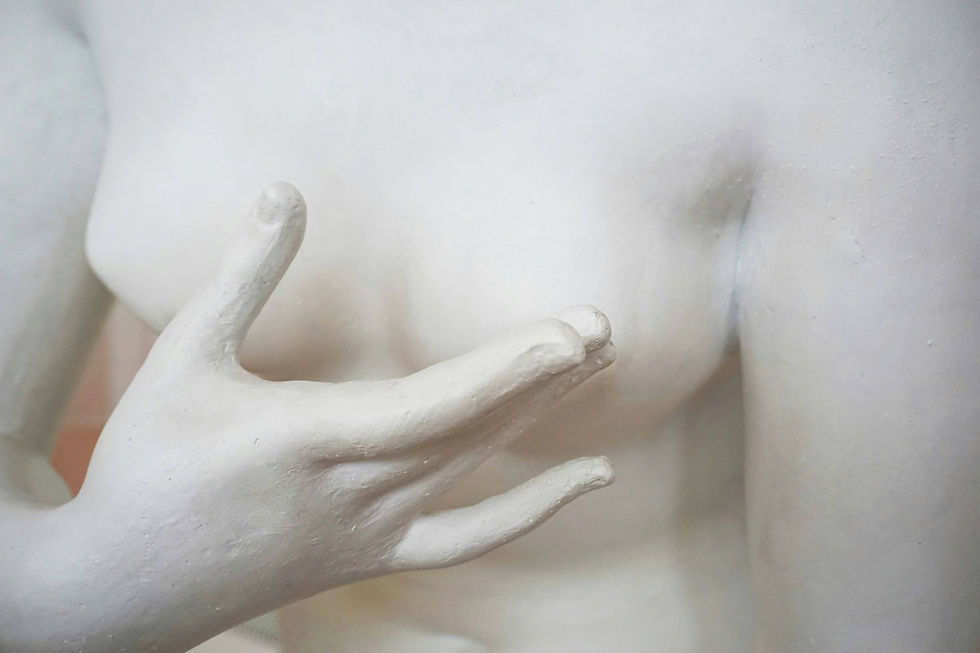A Word
- Avital Gad-Cykman

- Sep 18, 2024
- 4 min read
What we talk about when we talk about breasts.

It’s a blustery word. Say it and heads crane forward. Breasts: a word that’s become a concept, what with its numerous synonyms going from the intimate tits to the scientific mammary glandular, the ridiculous bazookas or lustful boobs, along with other twenty-something words. A range of embodied meanings stands at your service.
Choose a sexual, maternal, patriarchal, aesthetic, technological or artistic implication, and you’ll find it’s already been built within one of these words. Invent a nickname for this feminine part and it can silence a room.
As a site of attention, breasts rival with vagina and, perhaps, the butt. Ovaries, womb and other feminine organs don’t possess external manifestations and sexual magnitude. Legs only raise an eyebrow.
Breasts are noticed. When they are someone else’s they seem easy to live with. When they are mine, I close the dictionary and it slaps my fingers.
I need more, though. More words please, Waiter. Words to illustrate the embarrassment of waiting for my breasts to finally appear at fourteen. By then I believe that breasts, any breasts, even small elevations of the skin or two overgrown nipples would suffice to capture hearts. When they show-up, I feel grateful and awkward as I take them out to school and play. They give a girl whose male friends seem altered a new sense of power. But also: they drive her to spend hours in front of the mirror-mirror. Is the breasts’ shape fine, is their size good? Are they right? I’m not the most beautiful girl in the world, but I can pass as pretty and the breasts help.
I look at Mother to see what awaits me. Well, she’s too old, not old-old, but old enough to be irrelevant for tricks of fatal attraction, secrets of love. Mother is in her fifties, and toward the end of her life. Long before it happens, I look away from her to the girls wearing bikinis, passing tanning oil, their breasts rising in colorful bras from their hot oily bodies. Survival by imitation is common but impossible, so I keep trying to act naturally and let go. It’s a slow-learning process. Adopt slight gestures, avoid focusing on breasts, learn to love with all your body.
Once, a builder shouted at me “look at these baby-feeders.” I’m relieved that such comments regarding the female body are growing rarer. I hope we’ve turned the world's attention to the violence encompassed in defining us through our body parts.
However, my breasts have evolved from flat to surprisingly grown in my adolescence, to soft and sensitive breasts later on, to filled with milk for my babies, then to their overhanging shadow, involving fear, problematic genes, a threat. Family, friends, and acquaintances speak about cancer, suffer from cancer, survive it or not. In my family, one case after another introduces itself as the years pass. I become afraid.

See, I was raised on Solomon’s The Song of Songs where breasts are compared to pomegranates for their lush beauty and the sensuousness. But, open a pomegranate and see red all over.
Clearly my relations with my breasts have changed across my history.
In the next phase, I say: my breasts, my new breasts, my firm breasts, my scarred breasts, my silicon-filled breasts, my restored breasts. After the surgery, I observe my pink and purple empty breasts with horror and, yet, with distant curiosity. Since the breasts went under the knife, they have come to represent only five percent chance of a life risk instead of over seventy. This is the most important thing. This is what matters. I think it again. And again.
I need to feel it as well. I must accept these transformed things as mine. Remember, years earlier, the mirror reflected them to me, and in my imagination, many eyes observed and judged what I saw in the mirror. I wanted them to be acceptable, at least. It took me time, to accept and even appreciate my snug new breasts. When physical pain is over, humor returns. I create propaganda in their favor: you can run with them, jump with them, hit a wall and feel an antsy tickle at most. Another consolation prize: your breasts will hardly ever be squeezed again like ripe fruit in a mammography room.
Having come this far, when I say “breasts” nowadays, the word holds more than jovial discovery, plenitude, shame and joy. The word isn’t lost when you lose your breasts; it’s only changed for good. I feel it.
Avital Gad-Cykman is the author of Light Reflection Over Blues (Ravenna Press) and Life In, Life Out (Matter Press). She is the winner of Margaret Atwood Studies Magazine Prize and The Hawthorne Citation Short Story Contest, twice a finalist for the Iowa Fiction Award and a six-time nominee for the Pushcart. Her stories appear in Spectrum, The Dr. Eckleburg Review, Iron Horse, Prairie Schooner, Ambit, McSweeney’s Quarterly and Michigan Quarterly, twice in Best Short Fictions, W.W. Norton’s Flash Fiction International anthology and elsewhere. She holds a PhD in English Literature, focused on minorities, gender and trauma, and lives in Brazil.
Images:
Statue with demure hand by Victoria Strukovskaya
White breast by David Todd McCarty




Poignant and so relatable. Thank you